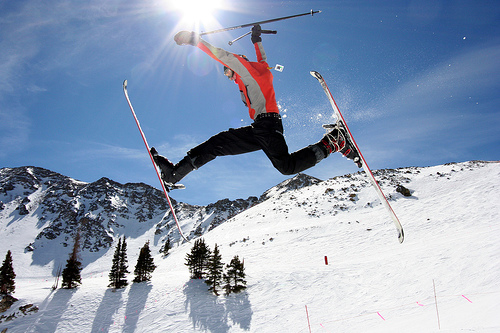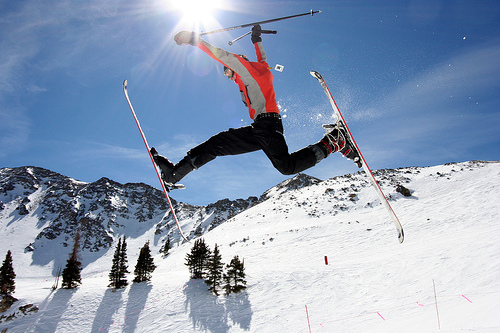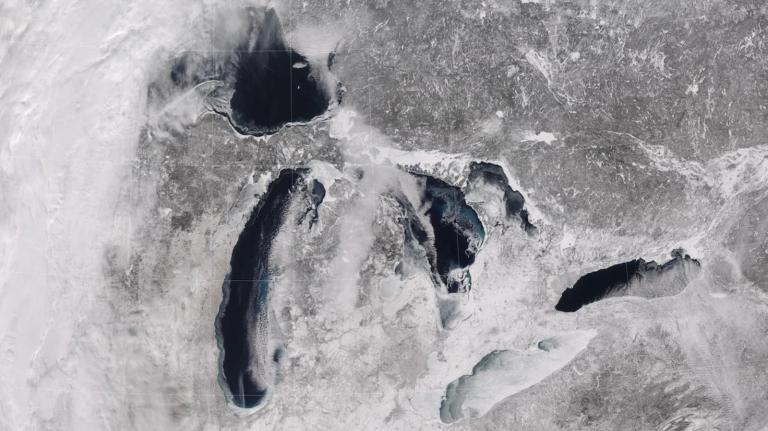 Photo: Shay HaasThis essay was originally posted on OutsideOnline and is reprinted here with their kind permission.
Photo: Shay HaasThis essay was originally posted on OutsideOnline and is reprinted here with their kind permission.
If there’s snow around, and you give an Inuit child one ski, or a Moroccan elder a plastic bag, both will naturally do one thing. They’ll slide downhill. Why? Because having fun is a piece of being human. A big piece.
That’s why 1,500 youth, but also some grandparents and half a dozen infants, gathered Sept. 23 on a rainy night in Whistler, British Columbia, for the world premiere of All.I.Can, a new ski film by some young and ambitious Canadian upstarts called The Sherpas. The crowd screamed at the expected ski acrobatics, but they also sat captivated and in awe as the film delivered a subtle message not typically found in so-called “ski porn.”
All.I.Can explores the common joy human beings of all cultures and ages derive from sliding on snow — and what we stand to lose if climate change destroys that opportunity. The film forces viewers to reflect on the beauty (and therefore preciousness) of the world — not just the snowcovered parts, and not just nature — as a source of redemption and happiness.
Walking around the lobby, I ran into representatives from Snowriders International, a new NGO dedicated to snowsports and the environment. It reminded me of the Mountain Riders Alliance, also formed recently “to develop values-based, environmentally friendly, rider-centric mountain playgrounds that encourage minimal carbon footprint.” Just last week, I joined big mountain snowboarder Jeremy Jones in Washington, D.C., along with Olympic snowboarder Gretchen Bleiler and skier Chris Davenport, fresh from the top of Everest, to ask legislators to save our $66 billion winter sports industry from climate change. Jones, who has two children, started his nonprofit, Protect Our Winters (POW), in 2007 in response to the visible changes he’s seen in the world. POW has 30,000 followers on Facebook.
Welcome to the cold revolution. The first generation of new era hot shots, initially out for a sick thrill, is looking for meaning, and they’re finding it primarily in the struggle to solve climate change. They probably won’t stop there. One of the producers of All.I.Can, the legendary ski trick innovator JP Auclair, recently launched a nonprofit called Alpine Initiatives, which taps his community’s boundless energy in support of humanitarian projects. How did environmental and social consciousness explode inside a generally superfluous and selfish pastime? How did skiing (and riding) get a new soul?
A little more than 15 years ago, snowsports underwent its first revolution. The advent of snowboarding had created a new subculture — it was disaffected, thrill seeking, and big air launching. Skateboarders of the alpine. With the help of shorter, fatter skis, that culture spread to skiing as well, eventually reaching audiences of hundreds of millions through the Winter X games. These radical tricksters adopted saggy L.A. gang style, and raged for more than a decade, pushing their sport into new levels of athleticism. But then something happened. They got older. And like many approaching midlife, they started looking for something other than big air to provide meaning in their lives.
The explosion of consciousness and advocacy on climate change is characterized by leadership from elders, respected and accomplished fixtures in their sport. And it’s also increasingly backed by savvy, and booming, outdoor businesses, like Black Diamond and The North Face. The former, through the leadership of CEO Peter Metcalf, has always avidly, and often radically, defended the environment, most famously threatening to move a huge outdoor industry conference out of Salt Lake City in response to then-Gov. Jon Hunstman’s position on wilderness. They won that battle. The North Face, through its support of groups like Protect Our Winters and All.I.Can, has quietly become the leader in climate advocacy in the apparel industry. The vibe they’ve helped create is palpable. At the premiere, I spoke briefly on the need for climate action, then retired to the floor for a beer. Within minutes, two North Face sponsored athletes from the film thanked me and asked how they could help.
Corporate support notwithstanding, the revolution is truly grassroots. One is hard pressed to find a single pro athlete who doesn’t want to mobilize on climate. The list goes on and on — for example, Bode Miller, Julia Mancuso, and Ted Ligety have already worked with World Wildlife Fund on climate issues.
At the same time, industry trade groups remain mostly passive on the issue. That, like the climate, will change. With climate’s palpable and urgent threat to a way of life, an unprecedented critical mass of smart and thoughtful athletes coming of age, and young visionaries like The Sherpas emerging from the sidelines, a whole hell of a lot of rock stars are going to be doing all they can.




